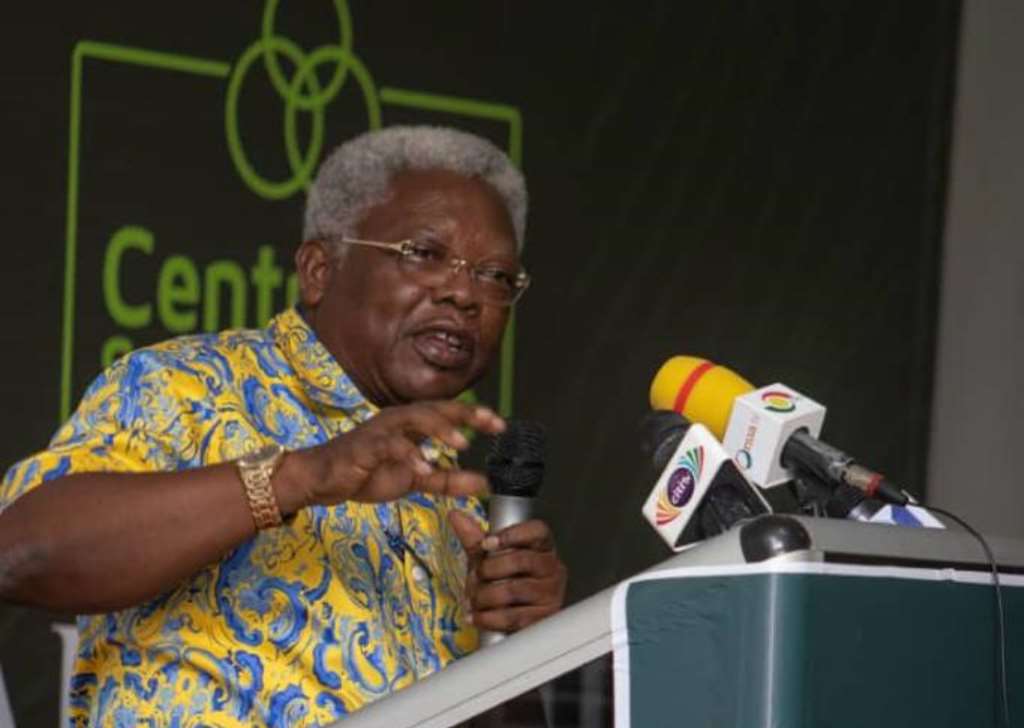In a bid to help curb corruption in Ghana, Justice Yaw Appau, a Judge of the Supreme Court says the fight against corruption should not be a blame game among the elite but all must get involved and help the government implement our public laws.
“Almost all the ‘big fishes’ who can break through fishing nets of corruption and crime or ‘big flies’ who normally break through cobwebs of corruption and crime in our public institutions, belong to the elite”, he stated in an eleven recommendations he made in a lecture he delivered at the 8th Leadership Dialogue Series in Accra.
The Series organised by the Centre for Social Justice (CSJ) and held at the Ghana Institute of Management Public Administration (GIMPA), was attended by many political analysts, anti-corruption and civil society organisations.
Justice Appau who is a former Sole Judgement Debt Commissioner who spoke on “Uprooting public sector and political corruption in Ghana” said “We are educated partially with the tax-payers’ money to enable us acquire knowledge for the development of our society for the betterment of our people. But what do we see? He asked.
“We turn round to milk the very people we are supposed to help and serve,” he opined, urging Ghanaians to use the knowledge that they had acquired to help raise the poor masses from the economic malaise in which they find themselves by being more sensitive, altruistic and proactive to their plight.
According to him, “We can do that by doing the right thing when we are entrusted with power or authority to act on their behalf. We have to build and strengthen our character.”
He was emphatic that “Our dishonesty and lack of integrity breeds dishonesty among the masses,” adding “That is why there is too much dishonesty and consequently corruption in our society.”
“The clean-up must start from the top. When the head is strong, the body cannot be weak but strong. But when the head is weak or rotten, the body too becomes automatically weak and smelly. I am of the conviction that, an annual national, regional, district and even constituency bi-partisan policy fair on corruption, would have a positive impact in uprooting or minimizing this canker,” he stressed.
As part of his eleven overarching recommendations for consideration, he called on the government to accelerate the process of implementing the right to information law.
Saying that data is a precious commodity that helps one to understand the world in which people live, he said “Financial data that tracks the money flowing in and out of government accounts arm citizens with the requisite information to hold their governments accountable for the use of public resources.
He also recommended that Parliament intensified its supervisory role in the operation of the Consolidated Fund, and ensure that the Auditor-General’s recommendations following each year’s public accounts audit are strictly adhered to.
“I am of the view that Parliament can perform this independent role better if a second look is taken at article 78(1) of the Constitution, 1992, which requires the President to appoint majority of his governing ministers from among members of Parliament,” he said, adding “The existing practice weakens Parliament’s resolve to check, scrutinize and curb excesses of the Executive because invariably the Executive has one of its legs in Parliament.”
The Supreme Court Judge admonished the media to observe or comply with the ‘hot-stove’ rule, asking them to “let the power of your pen and microphones burn every government, institution and individual without fear, favour or ill-will.”
He stated “There should not be any preferential treatment for anyone. What is good for the goose is good for the gander,” but pleaded that in doing so, the media must be constructive and objective always.
“The media’s duty, ethically, is to inform the public and unearth the truth behind the information being disseminated,” he added.
Justice Appau was of the view that “Our governments must work towards closing unemployment gaps and promote gender parity: many young men and women have no choice but to pay bribes in monetary terms or in kind, to middlemen with the hope of securing jobs that at times do not exist.”
All institutions need to create transparent and a merit-based recruitment process. Such interventions, coupled with expanded job opportunities, will reduce the desire to pay bribes in whatever form, for non-existing jobs.



